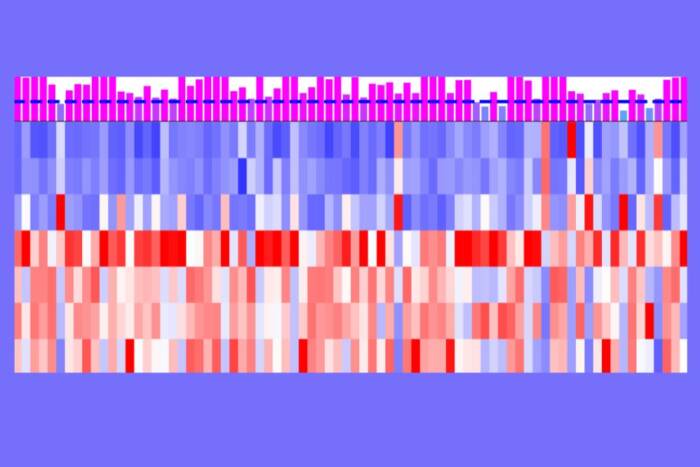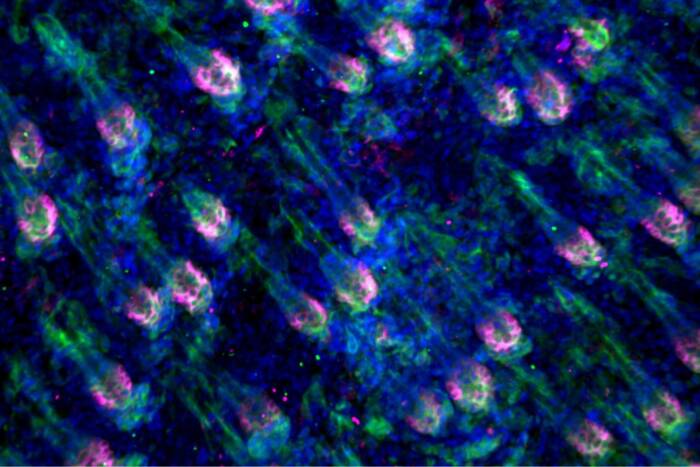Princeton physicist joins Rockefeller as part-time visiting professor
by TALLEY HENNING BROWN
 (opens in new window)There’s more than one way to visit. While Peter Goodfellow and Philip Campbell will each spend a few weeks here as visiting scholars, William Bialek has committed to a longer-term stay as a part-time visiting professor. A theoretical physicist and professor at Princeton University, Professor Bialek joined Rockefeller University this month and will spend approximately one-quarter of his time on campus, initially for a two-year period. The appointment, created to encourage further cross-disciplinary collaborative efforts across the physics-biology line, was discussed among faculty and administration over the summer months and made official in August.
(opens in new window)There’s more than one way to visit. While Peter Goodfellow and Philip Campbell will each spend a few weeks here as visiting scholars, William Bialek has committed to a longer-term stay as a part-time visiting professor. A theoretical physicist and professor at Princeton University, Professor Bialek joined Rockefeller University this month and will spend approximately one-quarter of his time on campus, initially for a two-year period. The appointment, created to encourage further cross-disciplinary collaborative efforts across the physics-biology line, was discussed among faculty and administration over the summer months and made official in August.
Educated at the University of California, Berkeley — where he received his Ph.D. in biophysics at the age of 23 — Prof. Bialek did postdocs at the University of Groningen in the Netherlands and the Institute for Theoretical Physics in Santa Barbara, then joined the faculty of UC Berkeley in 1986. In 1990, he joined the newly established NEC Research Institute (now the NEC Laboratories) at Princeton, becoming an institute fellow in 1999. He currently serves as John Archibald Wheeler/Battelle Professor in Physics at Princeton.
Prof. Bialek’s research interests cover a wide variety of theoretical problems at the intersection of physics and biology, from the dynamics of individual biological molecules to learning and cognition. He is perhaps best known for his work on coding and computation in the brain where, in close collaboration with experimentalists, he has shown how abstract mathematical ideas about signals, noise and information flow can be brought into direct contact with quantitative data on real neurons. This work has led to the demonstration that at least some aspects of brain function can be understood as nearly optimal strategies for dealing with the complex, dynamic signals that come to us through our senses, approaching fundamental physical limits to reliability and precision. Along the way to these results, Prof. Bialek and his collaborators discovered how to “read the neural code” in relatively simple nervous systems, such as the visual system of the fly, building a dictionary that translates between the sequences of electrical pulses generated by neurons and the sensory stimuli in the outside world. Unexpectedly, these ideas have found their way into current efforts by biomedical engineers to build prosthetic devices driven by neural signals. More recently, Prof. Bialek has been interested in connecting theoretical ideas of noise and information flow to a very different class of biological processes: the regulation of gene expression during the course of embryonic development.
Because cross-disciplinary interaction has been so crucial to his own work, Prof. Bialek has made efforts to bring this style of science to a broader audience, and has established several courses designed to bring scientists together. At Princeton, he developed a radically new, integrated science course for freshmen that unifies the teaching of physics, chemistry and biology. “Collaborative interactions, whether between theoreticians or between theorists and experimentalists, require an openness and familiarity that allows everyone to admit ignorance and to collaborate not just in the search for answers but in the formulation of the questions,” Prof. Bialek says.
University president Paul Nurse has been interested in attracting scientists for short-term and/or part-time appointments for some time, and outlined plans to do so in the university’s strategic plan in 2005. Prof. Bialek, whose research interests support and further the work of theoretical physicists and others already at Rockefeller, is the first appointment, one that has received enthusiastic support from a diverse group of faculty. He will be at Rockefeller one day a week during the regular academic year and will spend one summer month on campus. “Bill’s time at Rockefeller will expand the university’s knowledge base in more theoretical studies, a goal we have been working toward for some time. Many faculty members have shown unequivocal support for his appointment here and I am certain his association will be a fruitful one,” says Dr. Nurse.
“The difference between momentary interactions and lasting collaborations is the difference, if you will, between being a tourist and having a second home,” says Prof. Bialek. “My goals as visiting professor are to expand my own intellectual horizons and to contribute to the growth of a like-minded scientific community. Rockefeller seems an ideal place to try this.”


